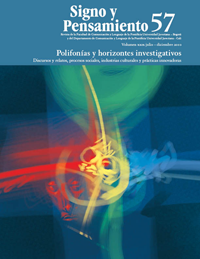Abstract
Herein we present both practical and theoretical arguments to strengthen our belief that the world is experiencing a spate of crucial lack of communication in spite of all the technological advances. This condition is due, in good part, to the disregard in which the subject, in its singularity, is held when producing and interpreting communication acts coming whether from philosophy, language studies, communication research, hermeneutics, and/or scientific research methods. We support our proposition by examining some of the ways in which the newspaper El Tiempo signifies. With the polyphonic and wide contributions of several particular interlocutors, we put forward an alternative explanation of both discourse and the act of communication.
Burger, P. et al. (1987), Estética de la recepción, Madrid, Arco/libros.
Foucault, M. (1970), El orden del discurso, Barcelona, Tusquets.
García Márquez, G. (1983), La soledad de América Latina, Bogotá, Corporación Editorial Universitaria de Colombia.
Jameson, F. (1989). Documentos de cultura documentos de barbarie, Madrid, Visor.
Lasch, S. (2002), Crítica de la información, Buenos Aires, Amorrortu.
Paz, O. (2004), El laberinto de la soledad, México, Fondo de Cultura Económica.
Ramírez, L. A. (2008), Comunicación y discurso, Bogotá, Magisterio.
Ricoeur, P. (2002), Del texto a la acción, México, Fondo de Cultura Económica.
— (1982), Hermeneutics and the Human Sciences, Cambridge, Cambridge University Press.
Sfez, L. (1995), Crítica de la comunicación, Madrid, Amorrortu Editores.
— (2007), La Comunicación. Buenos Aires, Amorrortu Editores Sodré, M. (1998), Reinventando la cultura, Barcelona, Gedisa.
Sperber, D. y Wilson, D. (1994). La relevancia. Madrid: Visor.
Vattimo, G. (1991), Ética de la Interpretación. Barcelona: Paidós Ibérica.
Winocur, R. (2009), Robinson Crusoe ya tiene celular, México, Siglo XXI.
This journal is registered under a Creative Commons Attribution 4.0 International Public License. Thus, this work may be reproduced, distributed, and publicly shared in digital format, as long as the names of the authors and Pontificia Universidad Javeriana are acknowledged. Others are allowed to quote, adapt, transform, auto-archive, republish, and create based on this material, for any purpose (even commercial ones), provided the authorship is duly acknowledged, a link to the original work is provided, and it is specified if changes have been made. Pontificia Universidad Javeriana does not hold the rights of published works and the authors are solely responsible for the contents of their works; they keep the moral, intellectual, privacy, and publicity rights.
Approving the intervention of the work (review, copy-editing, translation, layout) and the following outreach, are granted through an use license and not through an assignment of rights. This means the journal and Pontificia Universidad Javeriana cannot be held responsible for any ethical malpractice by the authors. As a consequence of the protection granted by the use license, the journal is not required to publish recantations or modify information already published, unless the errata stems from the editorial management process. Publishing contents in this journal does not generate royalties for contributors.


